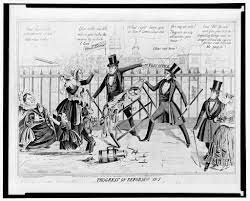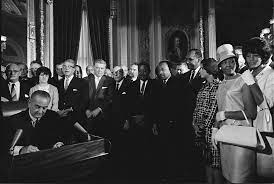When the American Civil War ended in 1865, the US was in a peculiar position. The defeat of the Confederacy had resulted in the freedom of four million Black people who were former slaves. This was formally done with the passage of the Thirteenth Amendment to the US constitution. For Black Americans, getting the full rights of citizenship, especially the right to vote, was the key to securing actual liberty and self-determination. The Black American abolitionist and former slave, Frederick Douglass had said in May 1865, just a month after the Union won the war that slavery couldn’t be completely abolished until blacks had voting rights.
Background
After the Union defeated the Confederacy and won the Civil War in April 1865, President Abraham Lincoln who had led the Nation from the beginning of the War till the end was assassinated just a few days after the Confederate surrender by a Southern sympathizer. As per the US Constitution, his Vice-President, Andrew Johnson became the next President. Johnson took over the responsibility for the country during the ‘Reconstruction’ era when the US slowly emerged from the devastation of the Civil War and rebuilt itself.
Johnson, though a Southerner, was a Unionist and believed strongly in the concept of states’ rights. He was very lenient to the white Southerners of the erstwhile Confederacy in his policies for the Reconstruction of the South. Though he asked the Southerners to pledge allegiance and loyalty to the Union and ratify the Thirteenth Amendment, he was otherwise liberal in granting them the liberty to reform their state governments following the War.

As a result, in the aftermath of the War, most Southern states enacted restrictive laws known as ‘Black codes’, which strictly governed Black citizens’ behavior and denied them voting and other basic rights. This was condemned by a section of the Republican Party known as ‘Radical Republicans’, who stated that the Black code laws were slavery in all but name. In 1866, the US Congress passed the Civil Rights Bill, which wanted to build on the guarantees of the Thirteenth Amendment of the US Constitution. When Johnson vetoed the bill exercising his power of veto, Congress overrode his veto. This was the first time in the nation’s history that an important law was passed over a presidential veto.
The Fourteenth and Fifteenth Amendments to the US Constitution
The passage of a new Reconstruction Act (also over Johnson’s veto) in March 1867 began the era of Radical, or Congressional, Reconstruction. Black American men voted in large numbers over the next decade of the 1870s in the American South, electing Black men to the US Congress and also helped in electing the next president after Johnson, former US Army general and Republican Ulysses S. Grant in 1868.
The Fourteenth Amendment which was approved by Congress in 1866 and ratified in 1868, granted American citizenship to all people born or naturalized in the US. This included the former slaves. The amendment also guaranteed equal protection of laws to all citizens. Congress passed the Fifteenth Amendment, the third of the Reconstruction Era, which stated that voting rights could not be denied or lessened by the federal or the state governments on grounds of race, color, and previous servitude.
The Reconstruction led to democracy for the Blacks for the first time in the South since the foundation of the US. However, the local powers in the states were mostly vested in the hands of Whites. Some of the ‘Black Codes’ explicitly prevented Blacks from voting. Black officials like Black voters faced the constant threat of coercion and violence, mostly by the Ku Klux Klan or other white supremacist groups. The Enforcement Acts increased federal penalties for voter intimidation, by groups like the Ku Klux Klan.
Though the 15th Amendment had barred discrimination of voting rights based on race, it allowed the states to determine the actual requirements for voting rights. Southern state legislatures used such qualifications like including literacy tests, poll taxes, and other discriminatory practices to deprive the majority of Black voters in the years after Reconstruction. So-called ‘Jim Crow’ laws enforcing legalized racial segregation at the state and local level were enacted in the American South in the late 19th and early 20th centuries by White-dominated state legislatures to deprive Blacks of the political and economic gains that they had made during the Reconstruction Era.
The Civil Rights Movement
In the 1950s and ‘60s, access to voting rights for African Americans, especially in the South became the main aim of the Civil Rights Movement. While the Civil Rights Act of 1964 finally banned organized segregation in schools and other public places, it couldn’t resolve the prejudice in the issue of suffrage.
The ruthless attacks by state and local authorities on peaceful, non-violent activists led by Rev. Dr. Martin Luther King, Jr. and other civil rights activists in Selma, Alabama in March 1965 drew great attention to the movement for voting rights. President Lyndon Johnson signed into law the Voting Rights Act in 1965, which banned literacy tests and other methods used to deprive Black voters of their voting rights. In 1966, the U.S. Supreme Court ruled in Harper v. Virginia Board of Elections that poll taxes which had been removed by the 24th Amendment in 1964 were unlawful for state and local elections

Before the passage of the Voting Rights Act, around 23 percent of eligible Black voters were registered across the country. By 1969 the number had risen to 61 percent. In 1980, the number of eligible Black voters in the South was greater than those in the rest of the nation. By the middle of the decade, there were more Black people in public office in the South than in the rest of the nation.
In 2012, the large turnout of Black voters which exceeded that of white voters for the first time in history helped reelect Barack Obama, the country’s first African American president. In 2013, the Supreme Court struck down a key provision of the Voting Rights Act, ruling in the Shelby v. Holder case that it was unlawful to require states with a history of segregation and discrimination of voters to seek the federal government’s approval before changing their election laws. Following the Court’s decision, many states passed new regulations on voting including limiting early voting and requiring voters to show photo ID. Critics say that these are meant to unfairly target poor, elderly, Black, and Latino voters.











